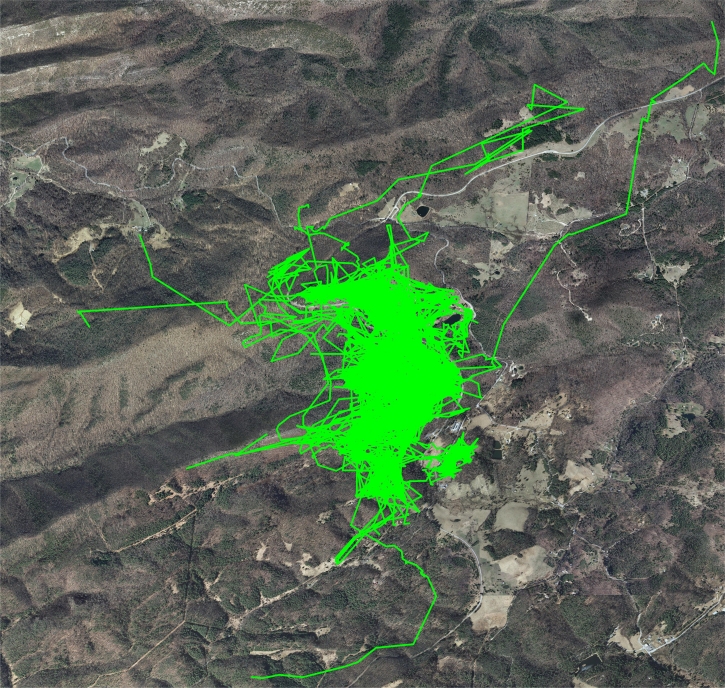Mistaking Transients, Mistaking Residents, and Transient ID
If found at the blue dot on 8/13/14 and tracked until 9/7/14 to a GPS distance of about 0.8 miles, this turtle might surely be identified as a transient traveling through the population.
The assumption might be that this transient has just crossed the road into the resident population, traveling east to west, coming from who knows where.
If the limited tracking is suspended at this point and not later resumed, this turtle would likely be recorded as a transient.
(This turtle is an adult female)
For some reason, this season she decided to travel well outside of her normal primary activity area (the powerline ROW).
She traveled to the highway (but never crossed), reversed direction traveling over the ridgetop into the adjacent hollow and found a tiny perennial seep and soaked in a small 1/4" deep pool of water for 18 days before heading upslope and crossed the ridgetop into another drainage where she found another tiny pool of water to soak.
It was evidently too late in the season for M4 to make it back to her primary activity area, but she did return in 2015 and hibernated near her normal hibernation spot that fall.
If found at the blue dot in the dense thorny growth of the meadow on 7/10/14 and tracked until 9/12/14, a distance of 0.8 miles, this turtle might be identified as a transient, despite being a female.
This small adult male turtle might have been found on 5/9/14 and tracked to 5/25/14 (a distance of 0.6 miles).
If found at the blue dot location in the power line ROW, this small male might have been tracked 6/11/14 to 9/6/14 and traveled 0.8 miles, and identified as a transient.
Or if found on 6/12/14 and tracked eastbound until 6/30/14, (0.5 miles)
If this male was found 5/25/14 and tracked westbound until 6/12/14, (0.4 miles), he might be identified as a transient.
Of 66 total locations recorded for turtle BT9 (red dots), only 9 were outside of an otherwise tight group of over 45 locations (at least 45 days), but BT9 was characterized as a transient and consequently "....home range data for this individual were not analyzed..."
This appears to have been a serious miscalculation, and unfortunately travel data for this potentially important local population resident was ignored instead of being followed throughout the season.
Even a basic understanding of a transient individual's travels through a local population would have eliminated the mistaken idenitification of of this resident member.
Continued tracking and observation of the 4 females, and other males in future seasons would likely locate turtle BT9 while mating or meeting with other residents.
'Resident individuals occasionally make off-area excursions lasting weeks to months, and return to their primary activity area and hibernate there.'
Studying transient Eastern Box turtles is tough. The amount of time and energy expended in tracking transients can be enormous and detract from studying residents. But perhaps the most difficult job in studying transients is identifying them when they are encountered. There is probably no way to search for transients, and once identified as a transient a newly found turtle might already be long gone and out of tracking range. Some researchers have estimated that as many as 26% of turtles found in a study area could be transients, but a more realistic estimate might be around 6%.
A composite of all turtle routes 2008 through 2023 in this study area showing the routes of transients leaving the resident population after traveling through.
Turtles M17, M20, M31 and M26 were lost after their radio signals could no longer be found. Other turtles recored and tagged and later lost and never re-found, may also be transients. Info labels and message vials are now being attached to suspected transients in case they are lost and later re-found.
For scale, this photo represents about 4300 acres
The tenacity of a transient to travel long distances, and in a particular direction has yet to be widely studied.
Turtle M31, M31A, M31B, M31C and M31D (all the same turtle) was found 7/30/14 in the power line ROW and was relocated back to the original location 5 times during the season. He was eventually lost when he out-distanced his radio's range.
Mistaken Identity: Real Life Examples
Eastern Box Turtle
Terrapene carolina carolina
A Relict Population Doomed To Extinction?














